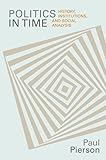Politics in Time : History, Institutions, and Social Analysis / Paul Pierson.
Material type: TextPublisher: Princeton, NJ : Princeton University Press, [2011]Copyright date: ©2004Edition: Course BookDescription: 1 online resource (208 p.) : 6 line illus. 4 tablesContent type:
TextPublisher: Princeton, NJ : Princeton University Press, [2011]Copyright date: ©2004Edition: Course BookDescription: 1 online resource (208 p.) : 6 line illus. 4 tablesContent type: - 9780691117140
- 9781400841080
- 320/.01
- JA78 .P54 2011
- online - DeGruyter
- Issued also in print.
| Item type | Current library | Call number | URL | Status | Notes | Barcode | |
|---|---|---|---|---|---|---|---|
 eBook
eBook
|
Biblioteca "Angelicum" Pont. Univ. S.Tommaso d'Aquino Nuvola online | online - DeGruyter (Browse shelf(Opens below)) | Online access | Not for loan (Accesso limitato) | Accesso per gli utenti autorizzati / Access for authorized users | (dgr)9781400841080 |
Browsing Biblioteca "Angelicum" Pont. Univ. S.Tommaso d'Aquino shelves, Shelving location: Nuvola online Close shelf browser (Hides shelf browser)

|

|

|

|

|

|

|
||
| online - DeGruyter Friendly Fire : The Accidental Shootdown of U.S. Black Hawks over Northern Iraq / | online - DeGruyter Is Multiculturalism Bad for Women? / | online - DeGruyter Methods for Applied Macroeconomic Research / | online - DeGruyter Politics in Time : History, Institutions, and Social Analysis / | online - DeGruyter Searching for a Corporate Savior : The Irrational Quest for Charismatic CEOs / | online - DeGruyter The Macropolitics of Congress / | online - DeGruyter The Translation Zone : A New Comparative Literature / |
Frontmatter -- Contents -- List of Figures and Tables -- Acknowledgments -- Introduction: Placing Politics in Time -- Chapter One. Positive Feedback and Path Dependence -- Chapter Two. Timing and Sequence -- Chapter Three. Long-Term Processes -- Chapter Four. The Limits of Institutional Design -- Chapter Five. Institutional Development -- Conclusion. Temporal Context in Social Science Inquiry -- Bibliography -- Index
restricted access online access with authorization star
http://purl.org/coar/access_right/c_16ec
This groundbreaking book represents the most systematic examination to date of the often-invoked but rarely examined declaration that "history matters." Most contemporary social scientists unconsciously take a "snapshot" view of the social world. Yet the meaning of social events or processes is frequently distorted when they are ripped from their temporal context. Paul Pierson argues that placing politics in time--constructing "moving pictures" rather than snapshots--can vastly enrich our understanding of complex social dynamics, and greatly improve the theories and methods that we use to explain them. Politics in Time opens a new window on the temporal aspects of the social world. It explores a range of important features and implications of evolving social processes: the variety of processes that unfold over significant periods of time, the circumstances under which such different processes are likely to occur, and above all, the significance of these temporal dimensions of social life for our understanding of important political and social outcomes. Ranging widely across the social sciences, Pierson's analysis reveals the high price social science pays when it becomes ahistorical. And it provides a wealth of ideas for restoring our sense of historical process. By placing politics back in time, Pierson's book is destined to have a resounding and enduring impact on the work of scholars and students in fields from political science, history, and sociology to economics and policy analysis.
Issued also in print.
Mode of access: Internet via World Wide Web.
In English.
Description based on online resource; title from PDF title page (publisher's Web site, viewed 29. Jul 2021)


